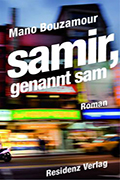When I write I am happy
After a longer break from Dutch literature the publishing house Residenz ventured a new start in 2016 with Samir, genannt Sam [Samir, named Sam], the translation of De belofte van Pisa [The Promis of Pisa] (2013) by Mano Bouzamour
Samir, genannt Sam

The motto of Samir, genannt Sam is derived from The Diary of Anne Frank: ‘I hope I shall be able to entrust you with anything, in a way I have never been able to with anyone.’ This sentence never left him, as Bouzamour repeatedly explained.
The author found that his readers must also experience this feeling, they should think that he wanted to personally give an account, which is reflected in the tone of the book. In Samir, genannt Sam Bouzamour tells the coming-of-age story of Samir Zafar, a muslim child from ‘De Pijp’ who has to muddle through his life in Amsterdam, with an adequate amount of humour, the tone at times reminding one of rap.
Multicultural identity is one of the main topics of Bouzamour’s debut novel in Austria. Being muslim isn’t ‘hip’, to say it in Samir’s words, that is made painfully clear. Moreover, Samir is torn between his parents’ world and that of his chic high school, into which he is accepted against all expectations. The announcement of the book by Residenz illustrates the various faces of the adolescent:
‘On a stolen grand piano Samir, called Sam, plays classical music in the mornings, during Friday prayer at the mosque he fights off phantasies of blond, naked female devils, during history classes he dreams of revenge for the courageous Anne Frank, but he is most happy when he gets to race through Amsterdam on a Vespa with his beloved brother during the night.’
Bestseller

In the Netherlands the publication of Bouzamour’s book hit like a bomb. Within a few months the book was reprinted several times and in no time Bouzamour became one of the most renowned Dutch authors. However, this wasn’t the only reason why Bouzamour’s work was translated, as the author was already known in the German-speaking world. In 2015 Bouzamour was a guest at the Anne-Frank-Friedenstage [Anne Frank Peace Days] in Bergen where he stayed as a ‘Stadtschreiber’ [Writer in Residence] in 2015/2016 and talked to the youth about the Holocaust.
‘Only if one knows history, one can better understand contemporary events, see them in various contexts more easily. […] I want to help find ways by which young people can approach history and its vastness in new ways, explore it. […] Above all, I want to call on people to reflect!’ (Anon., 2016a)
Last but not least Mano Bouzamour was one of the stars during the events in the context of the ‘Schwerpunkt Flandern und die Niederlande’ [Focal Point Flanders and the Netherlands] at the Frankfurt Book Fair in 2016, during which the topic of literature by people of migrational background took centre stage (#Fairs) and authors such as Mano Bouzamour and Fikry El Azzouzi – a Flemish author with Moroccan background – were at the centre of attention. Bouzamour repeatedly emphasised in interviews that he wasn’t happy with the fact that his novel Samir, genannt Sam was labelled as ‘migrant literature’.
‘He isn’t a migrant, says Bouzamour. After all, he was born in the Netherlands in 1991 and also grew up there. As one of several children of Moroccan immigrants. Nonetheless, he repeatedly asked himself who he might be: a Dutchman or a Moroccan? Or an Amsterdammer with Moroccan parents?’ (Bartlick, 2016)
Worth a trip

A similar hype as in the Netherlands did not develop around Bouzamour in Austria. In the Netherlands, just after the release of his book, he was given the chance to describe how he broke free of his Moroccan community just as his main character.
Everyone seemed to want to hear about how he suffered from the fact that his ‘literary act of liberation from religion’ (Angela Gutzeit, 2017) wasn’t received well by his community at first (Kaminski, 2014). After the publication of his debut novel Bouzamour had been shown the door by his parents. He had suddenly become persona non grata in his former social circle.
In Austria references were also made to the incidents, but no comparable ruckus arose. Bouzamour was one of the ‘star guests’ (Anon., 2016b) at the Buch Wien in 2016, but everything remained quiet (#Fairs). Even Bouzamour’s ‘partially not completely politically correct’ (Eidlhuber, 2017) exploration of the problems of Moroccan society was merely registered in Austria. One didn’t feel concerned. And anyway, was that really the intention? ‘When I write, I am happy’ said Bouzamour in 2017 in his interview for Der Standard as response to the question why he doesn’t speak out more clearly in his oeuvre about what is currently discussed in Austria e.g. ‘islamic fundamentalism and the daesh’. Maybe that is why it seems as though it were all about a problem of Amsterdam, and therefore worth a trip:
‘Once one picks up the book, one won’t put it away that quickly. The author who isn’t just a writer but also a virtuoso on the piano, not only makes one want to keep on reading but also want to take a trip to Amsterdam, to explore the non-touristy corners and the different neighbourhoods. Like a piece by Chopin, often fast-paced but also dreamy, it is a fresh, youthful book!’
Too good to be true
Bouzamour writes in a ‘cheeky, humorous and inconvenient’ (Bayer, 2016) fashion and doesn’t mince his words. In this respect Bouzamour’s novel befits the time. Samir, genannt Sam is a book for young readers and Bouzamour takes on the responsibility. “Marginalisation, failed integration, prejudice and right-wing populist problems are just as much addressed as criticism of religion and liberality.” (Bayer, 2016) and something must be done about this, said Bouzamour in 2017.
‘Some of us are also writers, actors and musicians now, and we have to ensure that things in the future will run better.’ (Eidlhuber, 2017)
This had never previously been addressed by an author from the Netherlands or Flanders in Austria. But what sounded convincing in the Netherlands with regard to the autobiographical background, apparently didn’t abroad. It can’t be that Bouzamour’s alter ego negates “all preconceptions […] about migrant communities that consequently” wrote Till Briegleb in the Süddeutsche Zeitung. He finds Bouzamour’s story “significantly too neat” (Briegleb, 2016) adding:
‘If the depressing reality of typical fates of second and third generation of immigrants falls somewhat short, then one forgives this jugglery quickly and readily, since in a politically venomous climate pretty lies might be more healing than sad truths.’ (Briegleb, 2016)
Mia Eidlhuber phrased it somewhat differently a few months later in Der Standard, fundamentally however, saying the same thing: she would have wished for something more than an ‘integration novel’ (Briegleb, 2016) with an autobiographical background. Vienna isn’t Amsterdam after all.
(Herbert Van Uffelen)
References
Anon.: Manos erstes Kapitel in Bergen. In: Celle Heute - Bergen, (2016). https://www.celleheute.de/manos-erstes-kapitel-in-bergen
Anon.: Buch Wien 16: Lange Nacht und ein paar lange Tage. In: Falter, Issue: 02.Nov., (2016).
Bayer, Tobias: Ein Junge will nach oben - Einwandererjugend in Amsterdam als Großstadtroman: Mano Bouzamours Debüt "Samir, genannt Sam". In: Frankfurter Allgemeine Zeitung, Issue: 10. Aug., (2016).
Bartlick, Silke: Realitätssüchtig - die Literatur Flanderns und der Niederlande. In: DW.com, (2016). [Ehrengäste der Frankfurter Buchmesse sind 2016 gleich anderthalb Länder: die Niederlande und das belgische Flandern. Was beide teilen, sind die gemeinsame Sprache und eine bemerkenswerte Literatur.] https://www.dw.com/de/realitätssüchtig-die-literatur-flanderns-und-der-niederlande/a-36032449
Briegleb, Till: Halbmondscheinsonate. In: Süddeutsche Zeitung, Issue: 18. Okt, (2016).
Eidlhuber, Mia: Meine Eltern können nicht lesen und schreiben - Schriftsteller Mano Bouzamour über Bildung, Bücher, seine Eltern und die muslimische Community in Europa. In: Der Standard - Literatur, Issue: 29. Jänner - Wien, (2017).
Gutzeit, Angela: Mano Bouzamour: „Samir, genannt Sam“ - Literarischer Befreiungsschlag von der Religion. In: Deutschlandfunk - Archiv, Issue: 9. Jan., (2017).
Kaminski, Astrid: Ohne Rücksicht auf Verluste. In: Frankfurter Allgemeine Zeitung - Feuilleton, Vol.: 150, (2.7.2014) - p. 13
